Design of a Professional Workshop: Cultural and Social Diversity
VerifiedAdded on 2022/10/01
|7
|1494
|249
Project
AI Summary
This assignment presents a comprehensive design for a three-day professional development workshop focused on cultural and social diversity. The workshop aims to enhance participants' understanding of diversity in the workplace, define culture and subculture, and develop their emotional and cultural intelligence. The activities include self-introductions, discussions on culture and subculture, exploration of acculturation strategies, case studies on risk mitigation, and assessments of emotional and cultural intelligence. Participants will also analyze a case study on cultural intelligence and design a presentation to demonstrate their ability to implement cultural intelligence in managing a globally diverse population. The workshop covers various topics, including emotional intelligence, cultural intelligence, and the development of strategies to address challenges related to diversity in a global organizational environment. References from academic sources are included to support the workshop's content.
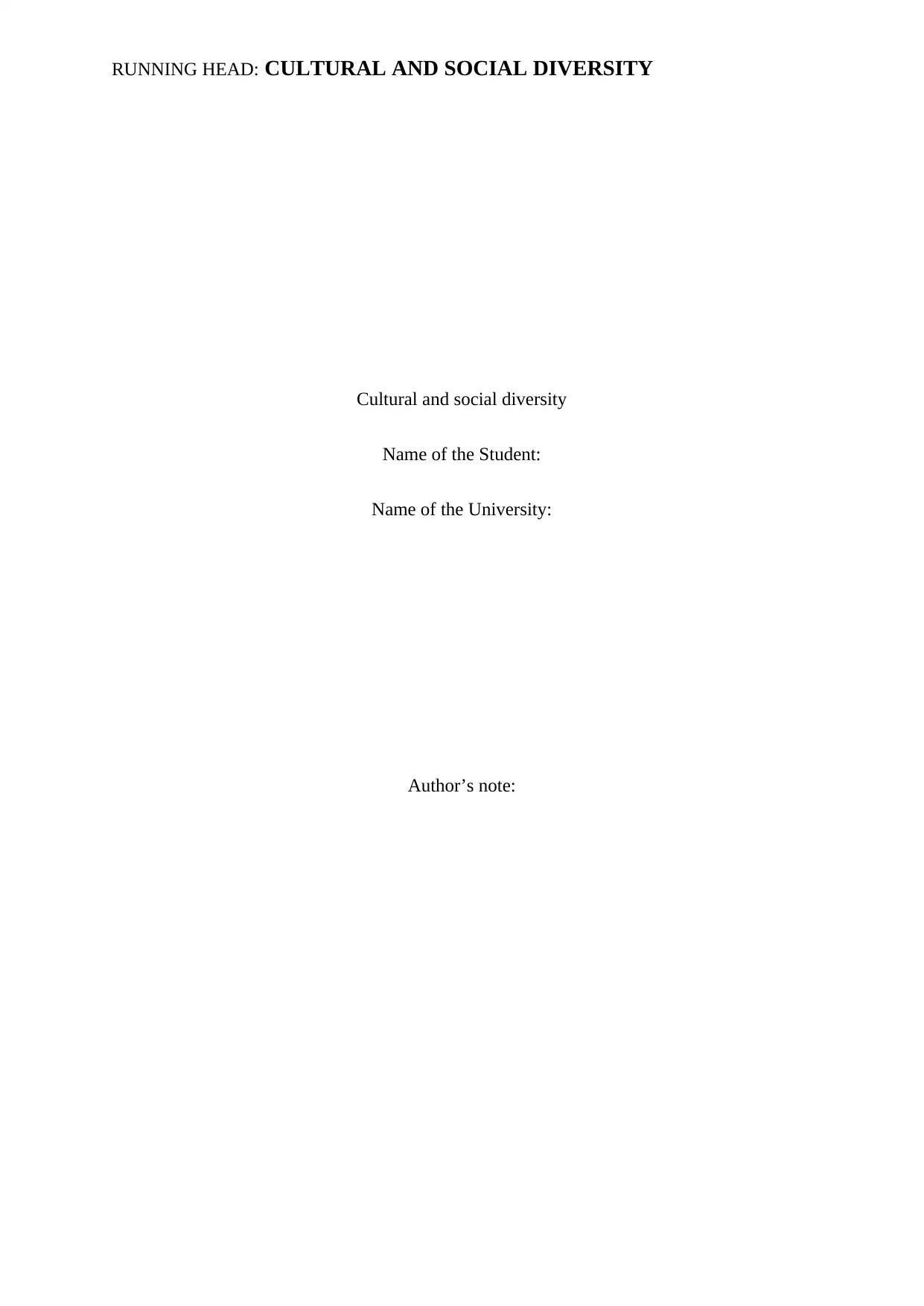
RUNNING HEAD: CULTURAL AND SOCIAL DIVERSITY
Cultural and social diversity
Name of the Student:
Name of the University:
Author’s note:
Cultural and social diversity
Name of the Student:
Name of the University:
Author’s note:
Paraphrase This Document
Need a fresh take? Get an instant paraphrase of this document with our AI Paraphraser
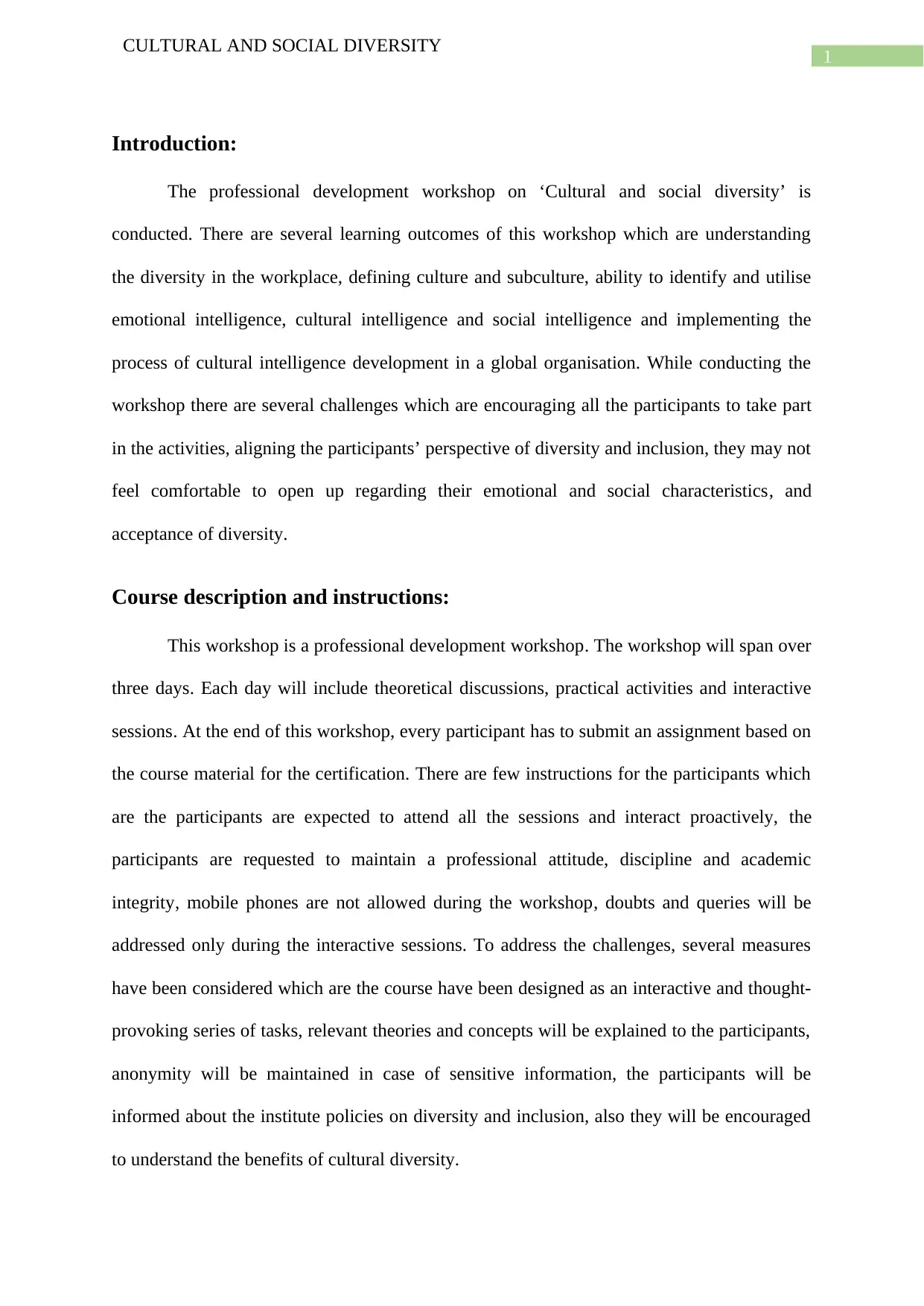
1
CULTURAL AND SOCIAL DIVERSITY
Introduction:
The professional development workshop on ‘Cultural and social diversity’ is
conducted. There are several learning outcomes of this workshop which are understanding
the diversity in the workplace, defining culture and subculture, ability to identify and utilise
emotional intelligence, cultural intelligence and social intelligence and implementing the
process of cultural intelligence development in a global organisation. While conducting the
workshop there are several challenges which are encouraging all the participants to take part
in the activities, aligning the participants’ perspective of diversity and inclusion, they may not
feel comfortable to open up regarding their emotional and social characteristics, and
acceptance of diversity.
Course description and instructions:
This workshop is a professional development workshop. The workshop will span over
three days. Each day will include theoretical discussions, practical activities and interactive
sessions. At the end of this workshop, every participant has to submit an assignment based on
the course material for the certification. There are few instructions for the participants which
are the participants are expected to attend all the sessions and interact proactively, the
participants are requested to maintain a professional attitude, discipline and academic
integrity, mobile phones are not allowed during the workshop, doubts and queries will be
addressed only during the interactive sessions. To address the challenges, several measures
have been considered which are the course have been designed as an interactive and thought-
provoking series of tasks, relevant theories and concepts will be explained to the participants,
anonymity will be maintained in case of sensitive information, the participants will be
informed about the institute policies on diversity and inclusion, also they will be encouraged
to understand the benefits of cultural diversity.
CULTURAL AND SOCIAL DIVERSITY
Introduction:
The professional development workshop on ‘Cultural and social diversity’ is
conducted. There are several learning outcomes of this workshop which are understanding
the diversity in the workplace, defining culture and subculture, ability to identify and utilise
emotional intelligence, cultural intelligence and social intelligence and implementing the
process of cultural intelligence development in a global organisation. While conducting the
workshop there are several challenges which are encouraging all the participants to take part
in the activities, aligning the participants’ perspective of diversity and inclusion, they may not
feel comfortable to open up regarding their emotional and social characteristics, and
acceptance of diversity.
Course description and instructions:
This workshop is a professional development workshop. The workshop will span over
three days. Each day will include theoretical discussions, practical activities and interactive
sessions. At the end of this workshop, every participant has to submit an assignment based on
the course material for the certification. There are few instructions for the participants which
are the participants are expected to attend all the sessions and interact proactively, the
participants are requested to maintain a professional attitude, discipline and academic
integrity, mobile phones are not allowed during the workshop, doubts and queries will be
addressed only during the interactive sessions. To address the challenges, several measures
have been considered which are the course have been designed as an interactive and thought-
provoking series of tasks, relevant theories and concepts will be explained to the participants,
anonymity will be maintained in case of sensitive information, the participants will be
informed about the institute policies on diversity and inclusion, also they will be encouraged
to understand the benefits of cultural diversity.
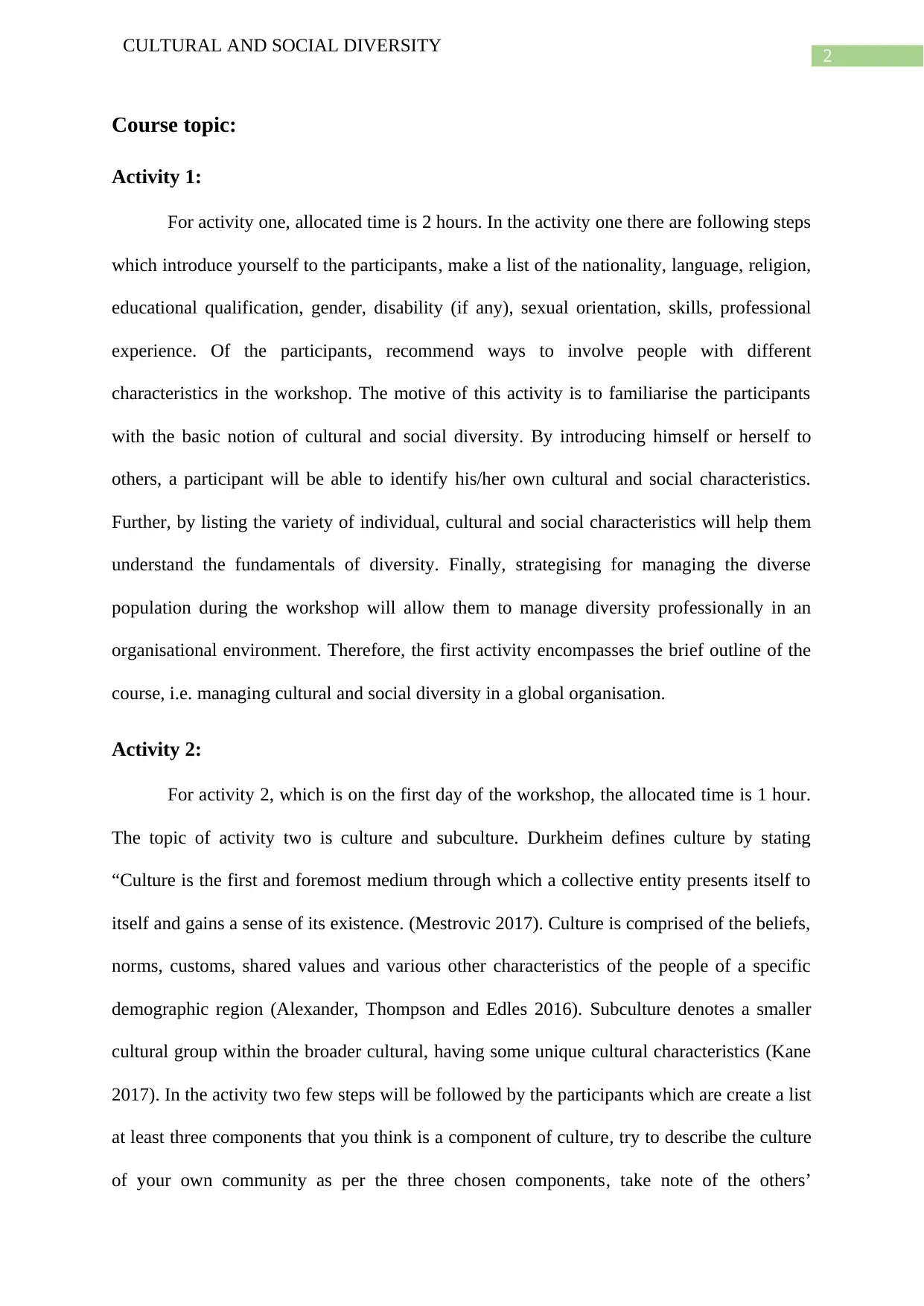
2
CULTURAL AND SOCIAL DIVERSITY
Course topic:
Activity 1:
For activity one, allocated time is 2 hours. In the activity one there are following steps
which introduce yourself to the participants, make a list of the nationality, language, religion,
educational qualification, gender, disability (if any), sexual orientation, skills, professional
experience. Of the participants, recommend ways to involve people with different
characteristics in the workshop. The motive of this activity is to familiarise the participants
with the basic notion of cultural and social diversity. By introducing himself or herself to
others, a participant will be able to identify his/her own cultural and social characteristics.
Further, by listing the variety of individual, cultural and social characteristics will help them
understand the fundamentals of diversity. Finally, strategising for managing the diverse
population during the workshop will allow them to manage diversity professionally in an
organisational environment. Therefore, the first activity encompasses the brief outline of the
course, i.e. managing cultural and social diversity in a global organisation.
Activity 2:
For activity 2, which is on the first day of the workshop, the allocated time is 1 hour.
The topic of activity two is culture and subculture. Durkheim defines culture by stating
“Culture is the first and foremost medium through which a collective entity presents itself to
itself and gains a sense of its existence. (Mestrovic 2017). Culture is comprised of the beliefs,
norms, customs, shared values and various other characteristics of the people of a specific
demographic region (Alexander, Thompson and Edles 2016). Subculture denotes a smaller
cultural group within the broader cultural, having some unique cultural characteristics (Kane
2017). In the activity two few steps will be followed by the participants which are create a list
at least three components that you think is a component of culture, try to describe the culture
of your own community as per the three chosen components, take note of the others’
CULTURAL AND SOCIAL DIVERSITY
Course topic:
Activity 1:
For activity one, allocated time is 2 hours. In the activity one there are following steps
which introduce yourself to the participants, make a list of the nationality, language, religion,
educational qualification, gender, disability (if any), sexual orientation, skills, professional
experience. Of the participants, recommend ways to involve people with different
characteristics in the workshop. The motive of this activity is to familiarise the participants
with the basic notion of cultural and social diversity. By introducing himself or herself to
others, a participant will be able to identify his/her own cultural and social characteristics.
Further, by listing the variety of individual, cultural and social characteristics will help them
understand the fundamentals of diversity. Finally, strategising for managing the diverse
population during the workshop will allow them to manage diversity professionally in an
organisational environment. Therefore, the first activity encompasses the brief outline of the
course, i.e. managing cultural and social diversity in a global organisation.
Activity 2:
For activity 2, which is on the first day of the workshop, the allocated time is 1 hour.
The topic of activity two is culture and subculture. Durkheim defines culture by stating
“Culture is the first and foremost medium through which a collective entity presents itself to
itself and gains a sense of its existence. (Mestrovic 2017). Culture is comprised of the beliefs,
norms, customs, shared values and various other characteristics of the people of a specific
demographic region (Alexander, Thompson and Edles 2016). Subculture denotes a smaller
cultural group within the broader cultural, having some unique cultural characteristics (Kane
2017). In the activity two few steps will be followed by the participants which are create a list
at least three components that you think is a component of culture, try to describe the culture
of your own community as per the three chosen components, take note of the others’
⊘ This is a preview!⊘
Do you want full access?
Subscribe today to unlock all pages.

Trusted by 1+ million students worldwide
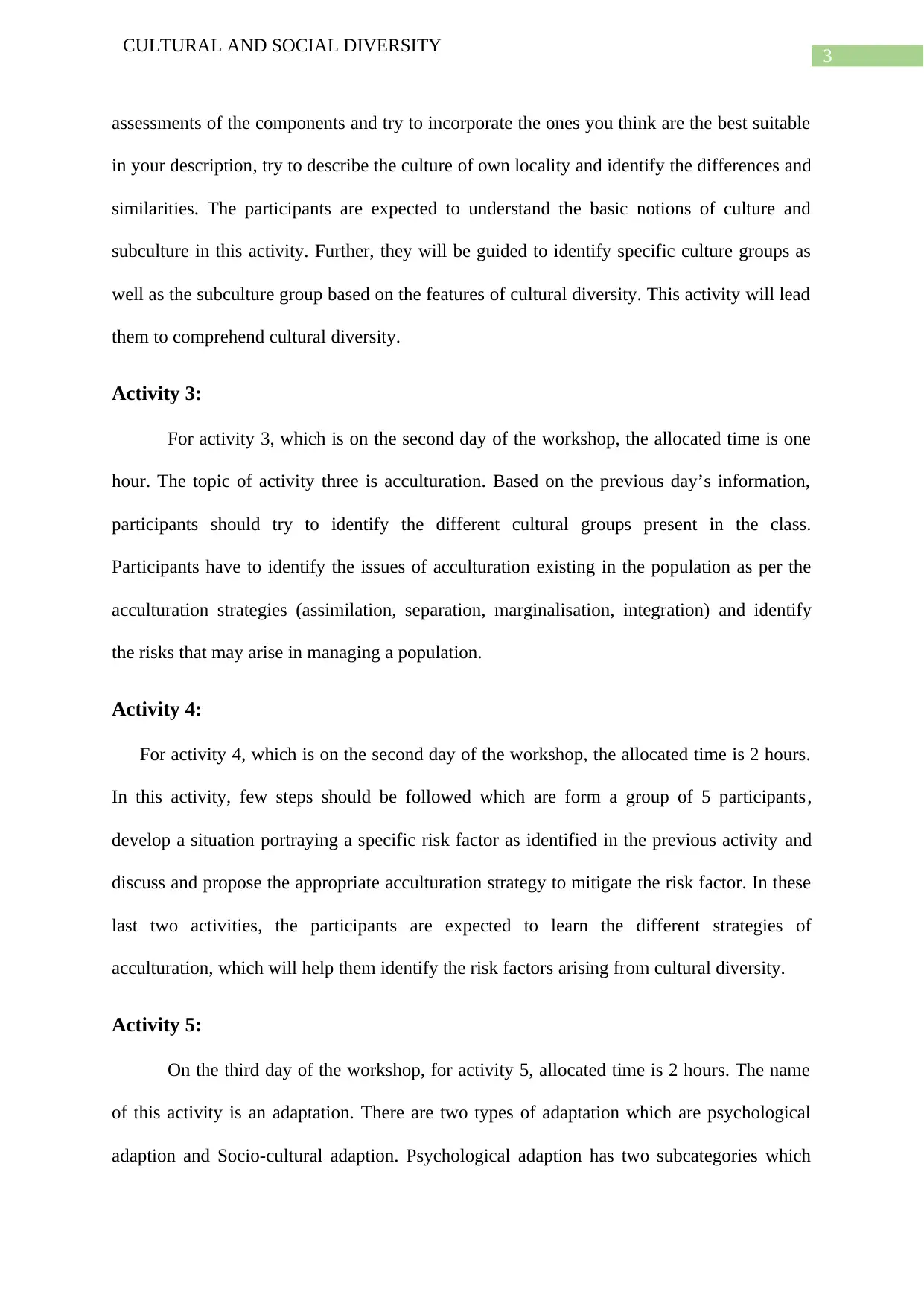
3
CULTURAL AND SOCIAL DIVERSITY
assessments of the components and try to incorporate the ones you think are the best suitable
in your description, try to describe the culture of own locality and identify the differences and
similarities. The participants are expected to understand the basic notions of culture and
subculture in this activity. Further, they will be guided to identify specific culture groups as
well as the subculture group based on the features of cultural diversity. This activity will lead
them to comprehend cultural diversity.
Activity 3:
For activity 3, which is on the second day of the workshop, the allocated time is one
hour. The topic of activity three is acculturation. Based on the previous day’s information,
participants should try to identify the different cultural groups present in the class.
Participants have to identify the issues of acculturation existing in the population as per the
acculturation strategies (assimilation, separation, marginalisation, integration) and identify
the risks that may arise in managing a population.
Activity 4:
For activity 4, which is on the second day of the workshop, the allocated time is 2 hours.
In this activity, few steps should be followed which are form a group of 5 participants,
develop a situation portraying a specific risk factor as identified in the previous activity and
discuss and propose the appropriate acculturation strategy to mitigate the risk factor. In these
last two activities, the participants are expected to learn the different strategies of
acculturation, which will help them identify the risk factors arising from cultural diversity.
Activity 5:
On the third day of the workshop, for activity 5, allocated time is 2 hours. The name
of this activity is an adaptation. There are two types of adaptation which are psychological
adaption and Socio-cultural adaption. Psychological adaption has two subcategories which
CULTURAL AND SOCIAL DIVERSITY
assessments of the components and try to incorporate the ones you think are the best suitable
in your description, try to describe the culture of own locality and identify the differences and
similarities. The participants are expected to understand the basic notions of culture and
subculture in this activity. Further, they will be guided to identify specific culture groups as
well as the subculture group based on the features of cultural diversity. This activity will lead
them to comprehend cultural diversity.
Activity 3:
For activity 3, which is on the second day of the workshop, the allocated time is one
hour. The topic of activity three is acculturation. Based on the previous day’s information,
participants should try to identify the different cultural groups present in the class.
Participants have to identify the issues of acculturation existing in the population as per the
acculturation strategies (assimilation, separation, marginalisation, integration) and identify
the risks that may arise in managing a population.
Activity 4:
For activity 4, which is on the second day of the workshop, the allocated time is 2 hours.
In this activity, few steps should be followed which are form a group of 5 participants,
develop a situation portraying a specific risk factor as identified in the previous activity and
discuss and propose the appropriate acculturation strategy to mitigate the risk factor. In these
last two activities, the participants are expected to learn the different strategies of
acculturation, which will help them identify the risk factors arising from cultural diversity.
Activity 5:
On the third day of the workshop, for activity 5, allocated time is 2 hours. The name
of this activity is an adaptation. There are two types of adaptation which are psychological
adaption and Socio-cultural adaption. Psychological adaption has two subcategories which
Paraphrase This Document
Need a fresh take? Get an instant paraphrase of this document with our AI Paraphraser
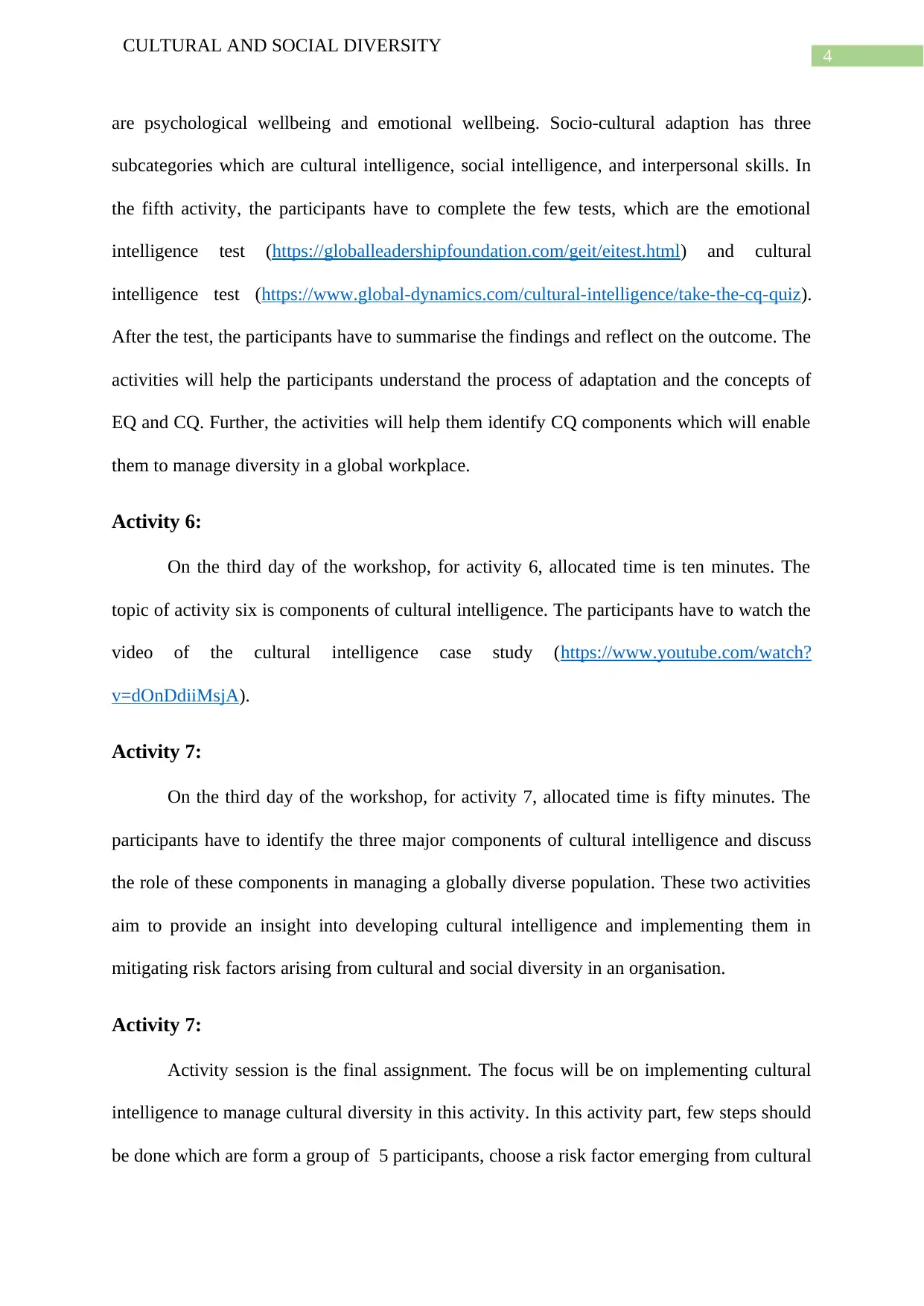
4
CULTURAL AND SOCIAL DIVERSITY
are psychological wellbeing and emotional wellbeing. Socio-cultural adaption has three
subcategories which are cultural intelligence, social intelligence, and interpersonal skills. In
the fifth activity, the participants have to complete the few tests, which are the emotional
intelligence test (https://globalleadershipfoundation.com/geit/eitest.html) and cultural
intelligence test (https://www.global-dynamics.com/cultural-intelligence/take-the-cq-quiz).
After the test, the participants have to summarise the findings and reflect on the outcome. The
activities will help the participants understand the process of adaptation and the concepts of
EQ and CQ. Further, the activities will help them identify CQ components which will enable
them to manage diversity in a global workplace.
Activity 6:
On the third day of the workshop, for activity 6, allocated time is ten minutes. The
topic of activity six is components of cultural intelligence. The participants have to watch the
video of the cultural intelligence case study (https://www.youtube.com/watch?
v=dOnDdiiMsjA).
Activity 7:
On the third day of the workshop, for activity 7, allocated time is fifty minutes. The
participants have to identify the three major components of cultural intelligence and discuss
the role of these components in managing a globally diverse population. These two activities
aim to provide an insight into developing cultural intelligence and implementing them in
mitigating risk factors arising from cultural and social diversity in an organisation.
Activity 7:
Activity session is the final assignment. The focus will be on implementing cultural
intelligence to manage cultural diversity in this activity. In this activity part, few steps should
be done which are form a group of 5 participants, choose a risk factor emerging from cultural
CULTURAL AND SOCIAL DIVERSITY
are psychological wellbeing and emotional wellbeing. Socio-cultural adaption has three
subcategories which are cultural intelligence, social intelligence, and interpersonal skills. In
the fifth activity, the participants have to complete the few tests, which are the emotional
intelligence test (https://globalleadershipfoundation.com/geit/eitest.html) and cultural
intelligence test (https://www.global-dynamics.com/cultural-intelligence/take-the-cq-quiz).
After the test, the participants have to summarise the findings and reflect on the outcome. The
activities will help the participants understand the process of adaptation and the concepts of
EQ and CQ. Further, the activities will help them identify CQ components which will enable
them to manage diversity in a global workplace.
Activity 6:
On the third day of the workshop, for activity 6, allocated time is ten minutes. The
topic of activity six is components of cultural intelligence. The participants have to watch the
video of the cultural intelligence case study (https://www.youtube.com/watch?
v=dOnDdiiMsjA).
Activity 7:
On the third day of the workshop, for activity 7, allocated time is fifty minutes. The
participants have to identify the three major components of cultural intelligence and discuss
the role of these components in managing a globally diverse population. These two activities
aim to provide an insight into developing cultural intelligence and implementing them in
mitigating risk factors arising from cultural and social diversity in an organisation.
Activity 7:
Activity session is the final assignment. The focus will be on implementing cultural
intelligence to manage cultural diversity in this activity. In this activity part, few steps should
be done which are form a group of 5 participants, choose a risk factor emerging from cultural
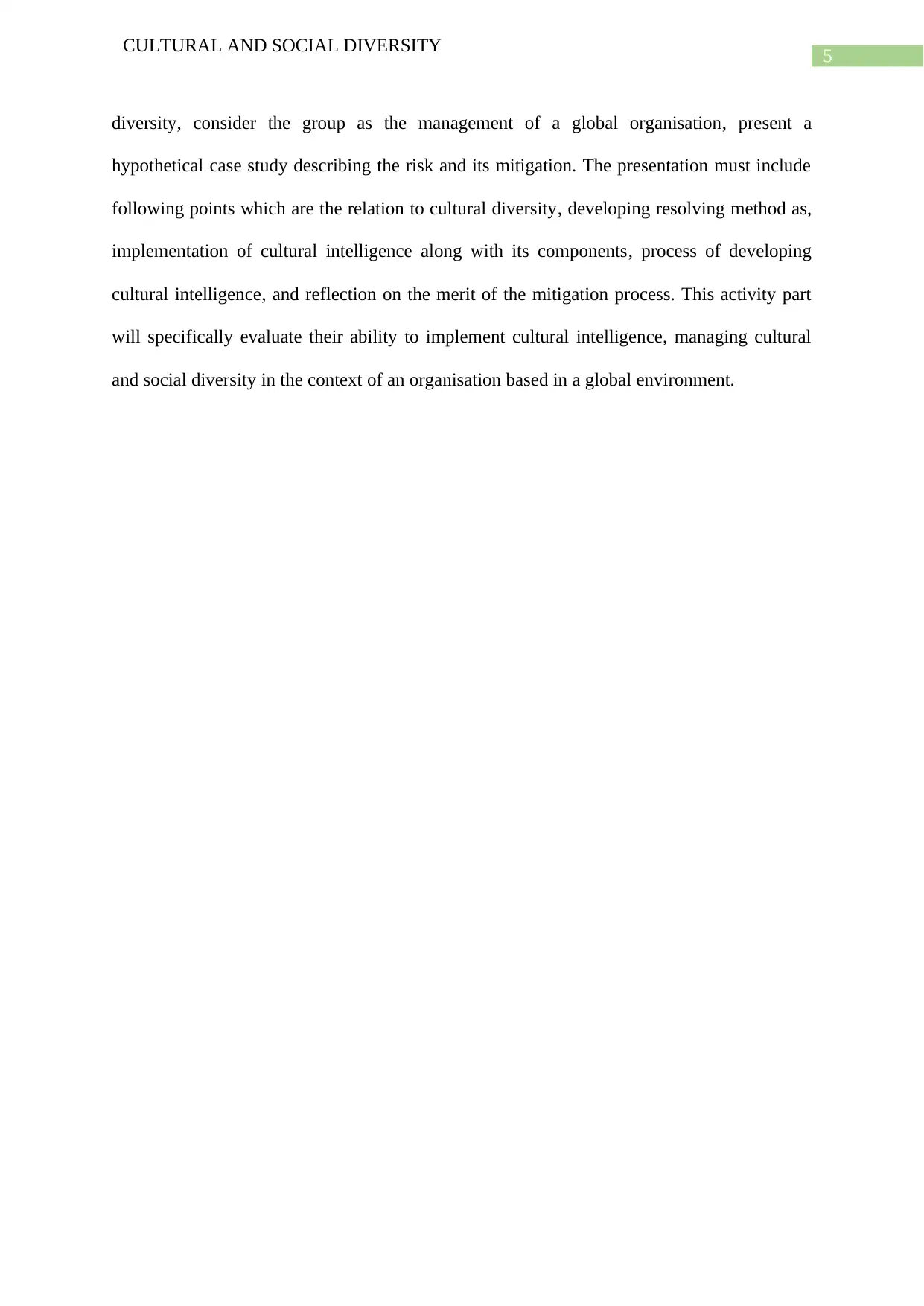
5
CULTURAL AND SOCIAL DIVERSITY
diversity, consider the group as the management of a global organisation, present a
hypothetical case study describing the risk and its mitigation. The presentation must include
following points which are the relation to cultural diversity, developing resolving method as,
implementation of cultural intelligence along with its components, process of developing
cultural intelligence, and reflection on the merit of the mitigation process. This activity part
will specifically evaluate their ability to implement cultural intelligence, managing cultural
and social diversity in the context of an organisation based in a global environment.
CULTURAL AND SOCIAL DIVERSITY
diversity, consider the group as the management of a global organisation, present a
hypothetical case study describing the risk and its mitigation. The presentation must include
following points which are the relation to cultural diversity, developing resolving method as,
implementation of cultural intelligence along with its components, process of developing
cultural intelligence, and reflection on the merit of the mitigation process. This activity part
will specifically evaluate their ability to implement cultural intelligence, managing cultural
and social diversity in the context of an organisation based in a global environment.
⊘ This is a preview!⊘
Do you want full access?
Subscribe today to unlock all pages.

Trusted by 1+ million students worldwide
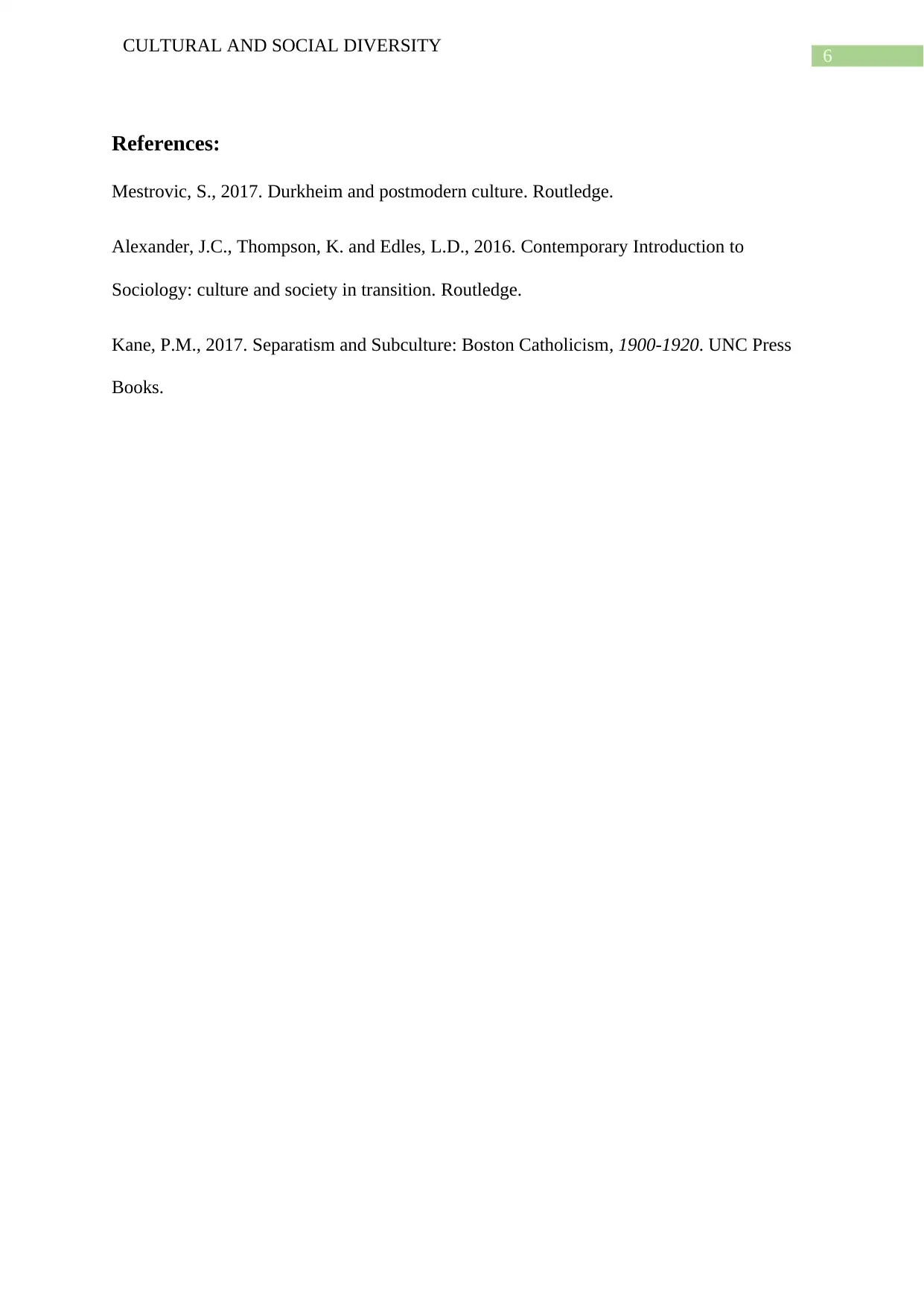
6
CULTURAL AND SOCIAL DIVERSITY
References:
Mestrovic, S., 2017. Durkheim and postmodern culture. Routledge.
Alexander, J.C., Thompson, K. and Edles, L.D., 2016. Contemporary Introduction to
Sociology: culture and society in transition. Routledge.
Kane, P.M., 2017. Separatism and Subculture: Boston Catholicism, 1900-1920. UNC Press
Books.
CULTURAL AND SOCIAL DIVERSITY
References:
Mestrovic, S., 2017. Durkheim and postmodern culture. Routledge.
Alexander, J.C., Thompson, K. and Edles, L.D., 2016. Contemporary Introduction to
Sociology: culture and society in transition. Routledge.
Kane, P.M., 2017. Separatism and Subculture: Boston Catholicism, 1900-1920. UNC Press
Books.
1 out of 7
Related Documents
Your All-in-One AI-Powered Toolkit for Academic Success.
+13062052269
info@desklib.com
Available 24*7 on WhatsApp / Email
![[object Object]](/_next/static/media/star-bottom.7253800d.svg)
Unlock your academic potential
Copyright © 2020–2026 A2Z Services. All Rights Reserved. Developed and managed by ZUCOL.





